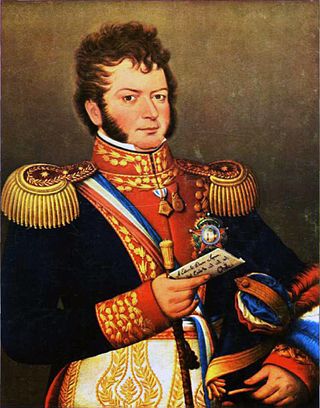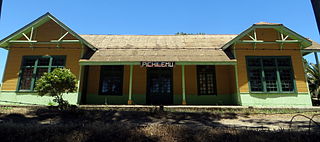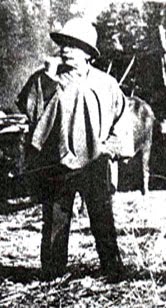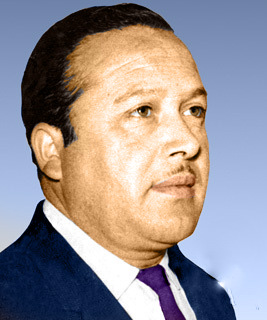
Bernardo O'Higgins Riquelme was a Chilean independence leader who freed Chile from Spanish rule in the Chilean War of Independence. He was a wealthy landowner of Basque-Spanish and Irish ancestry. Although he was the second Supreme Director of Chile (1817–1823), he is considered one of Chile's founding fathers, as he was the first holder of this title to head a fully independent Chilean state.

The Libertador General Bernardo O'Higgins Region, often shortened to O'Higgins Region, is one of Chile's 16 first order administrative divisions. It is subdivided into three provinces. It is named in honour of Bernardo O'Higgins Riquelme, one of Chile's founding fathers.

Rancagua is a city and commune in central Chile and part of the Rancagua conurbation. It is the capital of the Cachapoal Province and of the O'Higgins Region, located 87 km (54 mi) south of the national capital of Santiago.

Cardenal Caro Province is one of the three provinces of the central Chilean region of O'Higgins (VI). The capital of Cardenal Caro is Pichilemu.

Agustín Ross Cultural Centre, previously known as Casino Ross, is the cultural center of the city of Pichilemu in Libertador General Bernardo O'Higgins Region, Chile. It was constructed between 1906 and 1909 at the request of politician Agustín Ross Edwards. The structure of the cultural center is very similar to that of the Grand Trianon in Versailles, France.

Estación Pichilemu, also known as the Estación de Ferrocarriles de Pichilemu was a railway station in Pichilemu, Chile. It is a wood construction dated c. 1925, located in front of the Petrel Lake, near Daniel Ortúzar Avenue. It remained in operation until the 1990s, and became a National Monument on September 16, 1994. It has since become an arts and culture center, and tourism information office. It exhibits decorative and practical objects from the 1920s, and features many old suits.

Pichilemu post office building was a building located in Pichilemu, Chile, which served as the city's post office until 26 February 2010, the day before a magnitude 8.8 earthquake hit central Chile. The building was located in front of the Pichilemu Police station. It was demolished between 2 July until 3 July 2010.

The history of Pichilemu began around the 16th century, when Promaucaes inhabited the modern Pichilemu region. According to Chilean historiographer José Toribio Medina on his book Los Restos Indígenas de Pichilemu (1908), Spanish conqueror Pedro de Valdivia gave Topocalma encomienda, in which Pichilemu was supposed to be, to Juan Gómez de Almagro, on January 24, 1544.
The Mayor of Pichilemu is an elected politician who is the head of the executive branch of government of the commune of Pichilemu, Libertador General Bernardo O'Higgins Region, Chile. The mayor presides over the local city council, composed of six members, and serves as the civic representative of the commune. The mayor is popularly elected in a municipal election, by simple majority. The office is held for a four-year term without term limits.

The coat of arms of Pichilemu is the official heraldic symbol representing the city of Pichilemu, the capital of the Chilean province of Cardenal Caro. It consists of a party per cross referencing the importance of tourism in Pichilemu, and the commune's agricultural, huaso origins. The coat of arms is crested with a "symbolical representation of Pichilemu's past and present: a balustrade fused in a mitre", worn by José María Caro Rodríguez, the first Cardinal of the Chilean Roman Catholic Church, who was born in the village of San Antonio de Petrel, in Pichilemu.

José María Caro Martínez was a Chilean politician and civil servant. In May 1894, he was unanimously elected as the first mayor of the commune of Pichilemu, with Pedro Nolasco de Mira and Francisco Reyes made second and third magistrate respectively. Caro Martínez had previously served for several years as administrator or llavero of the San Antonio de Petrel hacienda and, between 1891 and 1892, was the Subdelegate of the 13th Subdelegation of San Fernando Department which comprised the district of Cáhuil.

Petrel Lagoon is a coastal lagoon located in Pichilemu beach, Chile, in front of Pichilemu railway station.
Pichilemo is the original spelling of the commune of Pichilemu, Chile.
San Antonio de Petrel is a small Chilean village located near the hacienda of the same name, in Pichilemu. It is located 18 kilometres (11 mi) east of Pichilemu. According to the 2002 census, the population of San Antonio de Petrel comprised 371 people, and 94 households.
San Miguel de las Palmas is a Chilean village located east of Pichilemu and San Antonio de Petrel, and southwest of Sauce. It is part of the commune of Marchigue.

Daniel Ortúzar Cuevas was a Chilean politician, who served as a deputy for San Fernando between 1891 and 1903, and deputy for Caupolicán —current Rengo— between 1903 and 1906.
Francisco Adriano Caro Rodríguez was the eighth mayor of the commune of Pichilemu, Chile, an office which he held between December 1925 and May 1927.

Washington Saldías Fuentealba was the 29th Mayor of the commune of Pichilemu, office which he held between May 1971 and September 1973: his term was interrupted by the 1973 Chilean coup d'état, which put General Augusto Pinochet in the power of the country, and who later appointed Carlos Echazarreta Iñiguez as the successor of Saldías. Saldías was also regidor of the commune of Pichilemu between 1963 and 1971, and a founding member of the Club Aéreo de Pichilemu.

Pedro Pablo Caro Rodríguez was a Chilean lawyer. After obtaining the degree of law and political sciences from the University of Chile, he worked as an independent lawyer in Rancagua, and served as acting judges in several communes and departments in Chile, including San Carlos, Curicó, Nacimiento, among others. He was also a secretary and treasurer of the municipality of Buin. Caro Rodríguez was member of the Conservative Party of Chile, and later of the Christian Democrat Party of Chile.

Pichilemu, originally known as Pichilemo, is a beach resort city and commune in central Chile, and capital of Cardenal Caro Province in the O'Higgins Region. The commune comprises an urban centre and twenty-two villages, including Ciruelos, Cáhuil, and Cardonal de Panilonco. It is located southwest of Santiago. Pichilemu had over 13,000 residents as of 2012.















